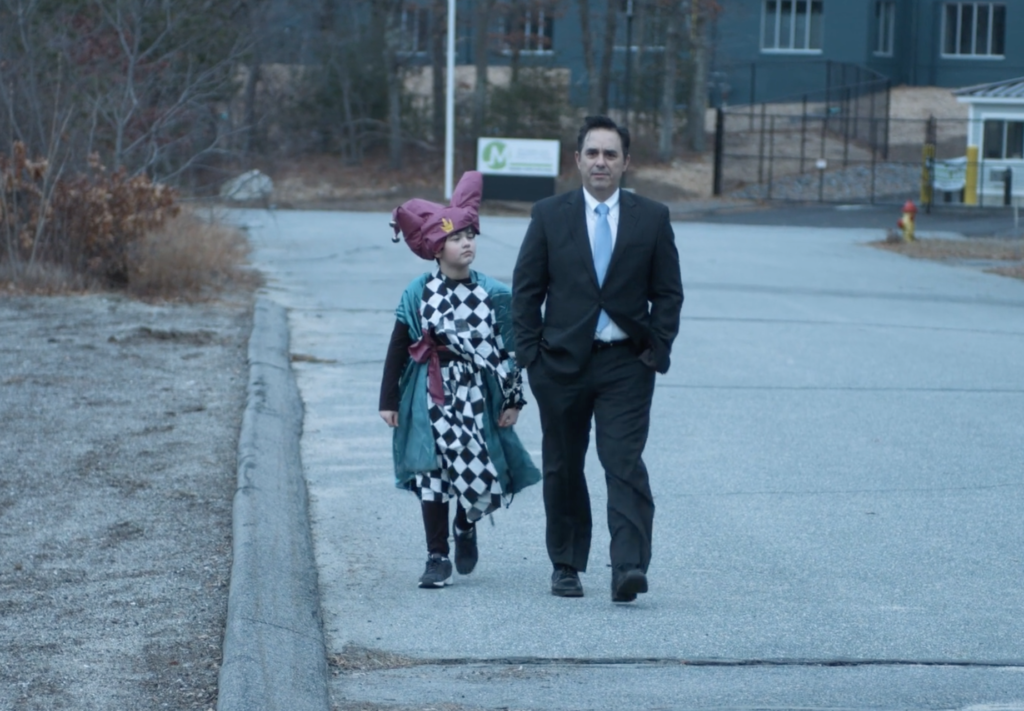Anxiety disorders are the most common mental illness in the U.S., affecting 40 million adults in the United States age 18 and older, or 18.1% of the population every year. Many of us have unfortunately encountered an anxiety attack, the feeling of utter helplessness and despair. It can be a challenge to complete the simplest of tasks, such as travel on a bus back home from work. Many films have covered the topic of anxiety, but director and writer Chris Esper has managed to do create a film which seems original and impactful with his latest short, “Imposter.”
Esper is a prolific filmmaker and has shot a number of different short films which have been comedies, but “Imposter” is far more serious and mature as a film. It shows us that Esper has the ability to adapt to any genre and is a strong, capable writer and director, because his characters are very well developed and three dimensional; it could have been far too easily for them to be stereotypes, but it’s clear that they all have their own backstories. “Imposter” is a brave film, it doesn’t mock the illness nor does it glamourise it, and it feels honest, personal and considerate of those who suffer from anxiety. It’s played out in almost complete silence for it’s nine-minute runtime, allowing the performances of the actors and the imagery to tell the story. As they say, a picture tells a thousand words.
In “Imposter,” we see a nameless man (Tom Mariano) at his workplace who is struggling to write and to speak up and answer his boss due to his anxiety (his anxiety is actually performed by a young boy in a jester outfit).There is a poetic shot of the man walking down the street with his imposter walking beside him, summing up how anxiety is always with you, wherever you go, making it impossible to escape.
 After work, the man gets on a bus, where he encounters other characters who in turn suffer from the same disorder. There’s a painter (Sheetal Kelkar) whose anxiety forces her to question if she is actually a good artist. Her imposter is naked holding up her canvas in front of her to shield her from her nudity, an impactful statement of how artists often use their work to hide their vulnerability. On the bus there is also a veteran (William DeCoff) suffering from PTSD, whose imposter is a younger version of himself, patriotic and ‘grunt-like’ who seems disgusted by the real version of himself, mocking him by dangling his dog tag in front of his face. There is a drag queen (Lakia Norwood), a baseball player (Vac Harris), an ice skater (Gina Peteronalla) among others who all have their own imposters sitting next to them serving as a brutal reminder of what could have been, shadowing every step their older ‘real’ counterparts, wearing looks of concern on their faces.
After work, the man gets on a bus, where he encounters other characters who in turn suffer from the same disorder. There’s a painter (Sheetal Kelkar) whose anxiety forces her to question if she is actually a good artist. Her imposter is naked holding up her canvas in front of her to shield her from her nudity, an impactful statement of how artists often use their work to hide their vulnerability. On the bus there is also a veteran (William DeCoff) suffering from PTSD, whose imposter is a younger version of himself, patriotic and ‘grunt-like’ who seems disgusted by the real version of himself, mocking him by dangling his dog tag in front of his face. There is a drag queen (Lakia Norwood), a baseball player (Vac Harris), an ice skater (Gina Peteronalla) among others who all have their own imposters sitting next to them serving as a brutal reminder of what could have been, shadowing every step their older ‘real’ counterparts, wearing looks of concern on their faces.
All of the performances are solid, and natural – I truly bought into each and every character. For me it was DeCoff who was particularly memorable as the PTSD afflicted veteran whose younger self becomes the catalyst for the film’s biggest moment. Watching him struggle with his inner demons was heartbreaking, and the film’s ending will stay with me for a long time, being so unexpected and shocking. The decision by Richard King (Director of Photography) to use a mid-long shot as the passengers depart the bus, really captures the impact of the act that has just occurred, with the score by Steven Lanning-Cafaro helping to create the atmosphere and mood of the film’s ending.
 Esper has stated that this is his most personal film to date, referencing the mental condition known as Imposter Syndrome – a psychological pattern that makes people believe that they are frauds and forces them to doubt all of their achievements and accomplishments. It is extremely relatable, as I suspect that many of us of have felt like imposters in certain situations, I know I have. Esper delivers a bold and compelling short with “Imposter” and it’s a film which will leave a lasting impression, with its very effective use of storytelling with compelling performances. Incredibly moving stuff.
Esper has stated that this is his most personal film to date, referencing the mental condition known as Imposter Syndrome – a psychological pattern that makes people believe that they are frauds and forces them to doubt all of their achievements and accomplishments. It is extremely relatable, as I suspect that many of us of have felt like imposters in certain situations, I know I have. Esper delivers a bold and compelling short with “Imposter” and it’s a film which will leave a lasting impression, with its very effective use of storytelling with compelling performances. Incredibly moving stuff.
– by Bianca Garner


